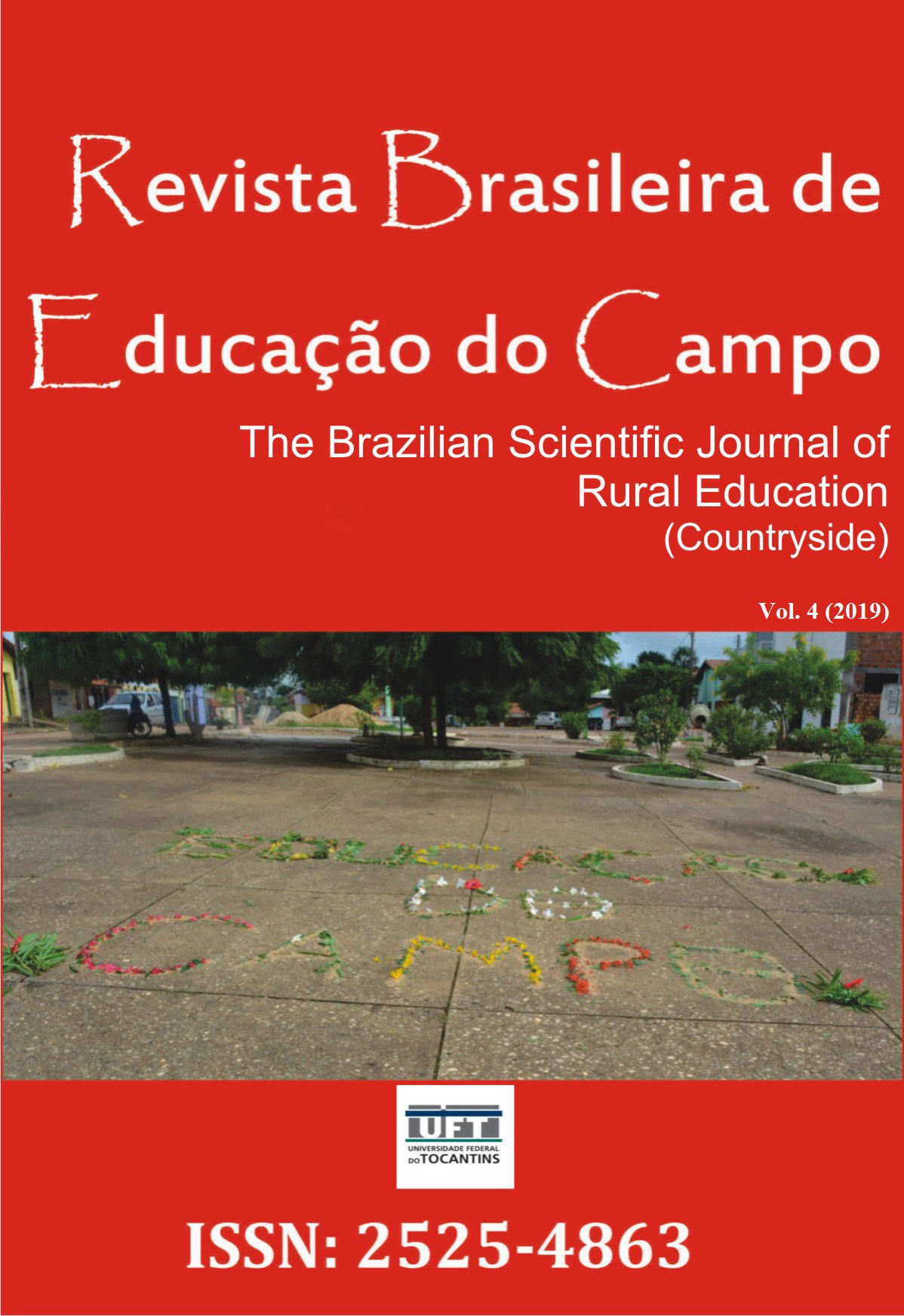Family Farm School: 50 years of history narrated by many voices
DOI:
https://doi.org/10.20873/uft.rbec.e7208Abstract
Abstract: In this article we expose the narratives of the movements that preceded the beginning of the activities of the Agricultural Family School of Olivânia. The study aimed to investigate the relationships between peasant families and the Olivânia Agricultural Family School. The processes investigations for production, systematization and data analysis benefited from semi-structured interviews, documentation analysis, direct observation, systematic records in field diary. The complex realities found were focused on comprehensive forms and contextualized in wheels of conversations with the protagonists of the research from the movements and moments of interaction enhanced by the Pedagogy of Alternation. At the end of the 1960s, his initial moments were accompanied by mobilizations organized by the Promotional Education Movement of Espírito Santo - Mepes, which began its activities in the municipalities of Anchieta, Alfredo Chaves, Rio Novo do Sul, Piúma and Iconha. The articulations and mobilizations for the implementation of the construction project of the building for school activities are described, the result of the concerns of Dom Helvécio Gomes de Oliveira and the peasant families living in the Coryndiba River Valley. Once the facilities were completed, it was noticed that the project for the consolidation of this dream required much more than the building. Its occupation alternates, between priestly college, residence of priests, sale post of agricultural and social ducefying inputs, ending, on March 10, 1969, with the inauguration of the School of the Rural Family of Olivânia.
Keywords: Peasant family, Pedagogy of alternation, Popular education, Popular participation.
Downloads
References
Betto, F. (1979). A educação nas classes populares. In Félix, M. et al. (Orgs.). Encontros com a civilização brasileira (pp. 162-173). Rio de Janeiro: Civilização Brasileira, n. 13.
Bordenave, J. E. D. (1994). O que é participação. São Paulo: Brasiliense.
Brandão, C. R. (2007). O que é Educação. São Paulo: Brasiliense. (Coleção Primeiros Passos; 20).
Brandão, C. R. (1995). A partilha da vida. São Paulo: Geic/Cabral Editora.
Brandão, C. R. (1986). Educação popular. São Paulo: Brasiliense.
Brandão, C. R. (1985). Lutar com a palavra. 2. ed. Rio de Janeiro: Graal.
Brandão, C. R. (1983). O ardil da ordem: caminhos e armadilhas de educação popular. Campinas: Papirus.
Brandão, C. R. (1980). Da educação fundamental ao fundamental da educação. Cadernos Cedes, 1(1), 5-35.
Calazans, M. J. C. (1979). (Coord.). Estudos retrospectivos da educação rural no Brasil. Rio de Janeiro: Fundação Getúlio Vargas (FGV), Instituto de Estudos Avançados em Educação (Iesae).
Caliari, R. (2012). A prática pedagógica da formação em alternância: novos espaços possíveis. Rivista Visioni Latinoamericane, 4(7), 140-155.
Conselho Estadual de Educação Espírito Santo (CEE/ES). (1978). Parecer no 40/78. Autoriza o Mepes a criar um Curso Técnico em Agropecuária em Olivânia. Vitória, p. 5.
Conselho Estadual de Educação Espírito Santo (CEE/ES). (1972). Selecta. Secretaria Estadual de Educação. Vitória, v. 3.
Marchesi, F. G. (1930). Breve histórico da localidade denominada S. Miguel do Rio Coryndiba sita atualmente no município de Guarapary (Estado do Espírito Santo). Marianna: Typographia Archiepiscopal.
Martins, J. S. (1981). A valorização da escola e do trabalho no meio rural. In Werthein, J., & Bordenave, J. D. (Orgs.). Educação rural no Terceiro Mundo: experiências e novas alternativas (pp. 249-270). Rio de Janeiro: Paz e Terra.
Movimento de Educação Promocional do Espírito Santo (Mepes). (1968). Regimento interno provisório das Escolas Família Rurais do MEPES. Mimeografado, (mimeografado).
Movimento de Educação Promocional do Espírito Santo (Mepes). (1969). Folheto de divulgação da Escola da Família Rural. Anchieta.
Reijntjes, C., Haverkort, B., & Waters-Bayer, A. (1994). Agricultura para o futuro: uma introdução à agricultura sustentável e de baixo uso de insumos externos. Tradução de John Cunha Comeford. Rio de Janeiro: AS-PTA.
Tedesco, J. C. (1999). Terra, trabalho e família: racionalidade produtiva e ethos camponês. Passo Fundo/RS: UDIUPF.
Saviani, D. (2007). História das ideias pedagógicas no Brasil. Campinas: Autores Associados.
Sousa, J. M. (1950). Educação rural pela escola primária. Revista Brasileira dos Municípios, 3(12), 1095-1105.
Szmrecsányi, T., & Queda, O. (1979). Vida rural e mudança social. 2. ed. São Paulo: Nacional.
Woortmann, E. F., & Woortmann, K. (1997). O trabalho da terra: a lógica e a simbólica da lavoura camponesa. Brasília: UNB.
Zamberlan, S. (2004). O lugar da família na vida institucional da escola família: participação e relação do poder (Dissertação de Mestrado). Universidade Nova de Lisboa, Brasília.
Published
How to Cite
Issue
Section
License
Proposal for Copyright Notice Creative Commons
1. Policy Proposal to Open Access Journals
Authors who publish with this journal agree to the following terms:
A. Authors retain copyright and grant the journal right of first publication with the work simultaneously licensed under the Creative Commons Attribution License that allows sharing the work with recognition of its initial publication in this journal.
B. Authors are able to take on additional contracts separately, non-exclusive distribution of the version of the paper published in this journal (ex .: publish in institutional repository or as a book), with an acknowledgment of its initial publication in this journal.
C. Authors are permitted and encouraged to post their work online (eg .: in institutional repositories or on their website) at any point before or during the editorial process, as it can lead to productive exchanges, as well as increase the impact and the citation of published work (See the Effect of Open Access).















